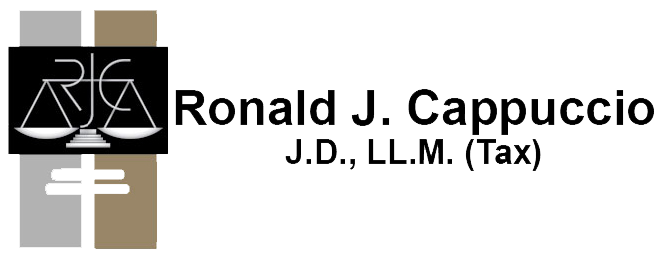Keeping The Right Records
Basic Rule: Before you make a donation, call Ronald J. Cappuccio, J.D., LL.M. (Tax) at 856-665-2121.
Generally, you can deduct the full amount of cash contributions up to 50 percent of your adjusted gross income (AGI) determined on your US 1040 Income tax Return. Most taxpayers do not have to worry about this limit.
The government has established an onerous record-keeping burden to discourage you from taking your rightful charitable deductions on your tax returns.
Record-Keeping Rule
For donations of $250 or more, you must get a written receipt from the charity before you file your tax return. The charitable receipt must include:
- The amount of the donation
- A detailed description of the property
- The value of any benefit received from the charity (meals, gifts, etc.)
Further, cash donations must be substantiated by a cancelled check, bank record, credit or debit card statement, or by a written statement provided by the charity.
What About Gifts Of Property?
There are even harsher rules for gifts of property and tangible items. In order for you to get a deduction, the charity must actually use the item to further its tax-exempt purpose. For example, if you donate artwork to a charitable organization, you get no deduction if the charity does not display or use it. Further, there must be an expensive, independent contemporaneous appraisal to demonstrate value if the deduction exceeds $5,000.
Qualified Appraisers
A qualified appraiser must:
- Be professionally certified or meet IRS education and experience requirements
- Be familiar with appraising the kind of item being donated
- Regularly make appraisals for a fee
- Meet IRS Tax Regulation requirements
In addition, the IRS forces the appraiser to declare that he or she meets the requirements for being “qualified.” Taxpayers frequently must attach a summary to the tax return. The summary should reflect records that:
- Name the charitable recipient of the contribution
- Identify the date and location of the contribution
- Detail a description of the property
- Indicate its value
- State taxpayer’s basis in the property
Contributions Of Clothing And Household Items
Deductions for contributions of clothing and household items are permitted only if they are in good used condition or better. Household items include furniture, electronics, appliances and linens. There is an exception allows for single items that are not in “good” condition or better if they are appraised at more than $500.
Contact Ronald J. Cappuccio
I can help you make sound decisions and guide you to keep solid records. Send me an email or call me at 856-665-2121 or text me at 856-745-4330 to initiate a consultation before you make a cash charitable contribution with unforeseen tax consequences.
